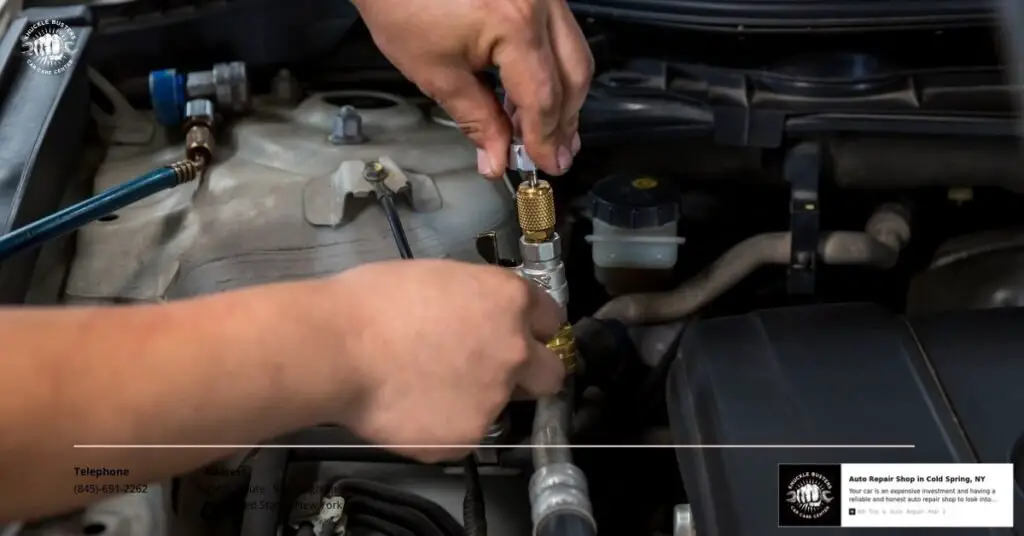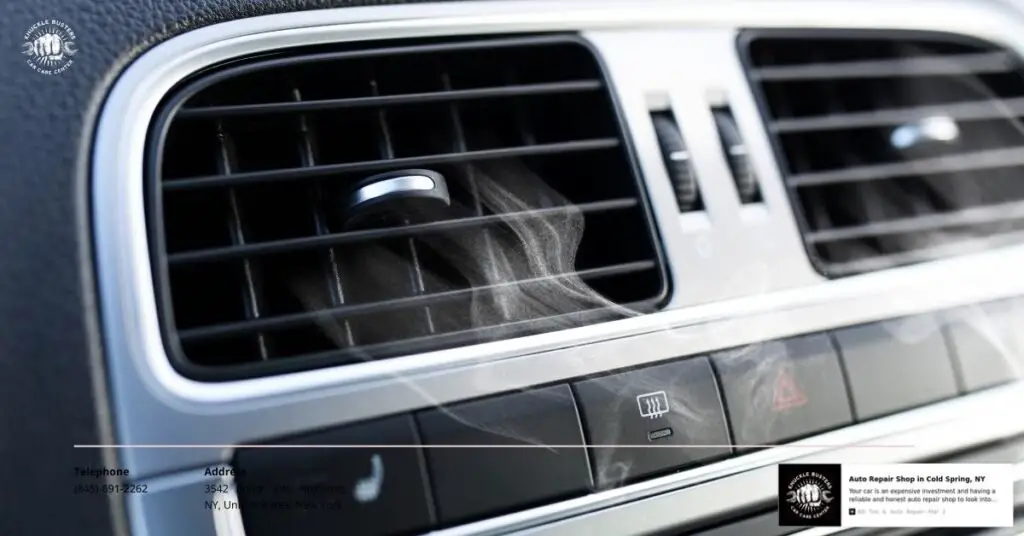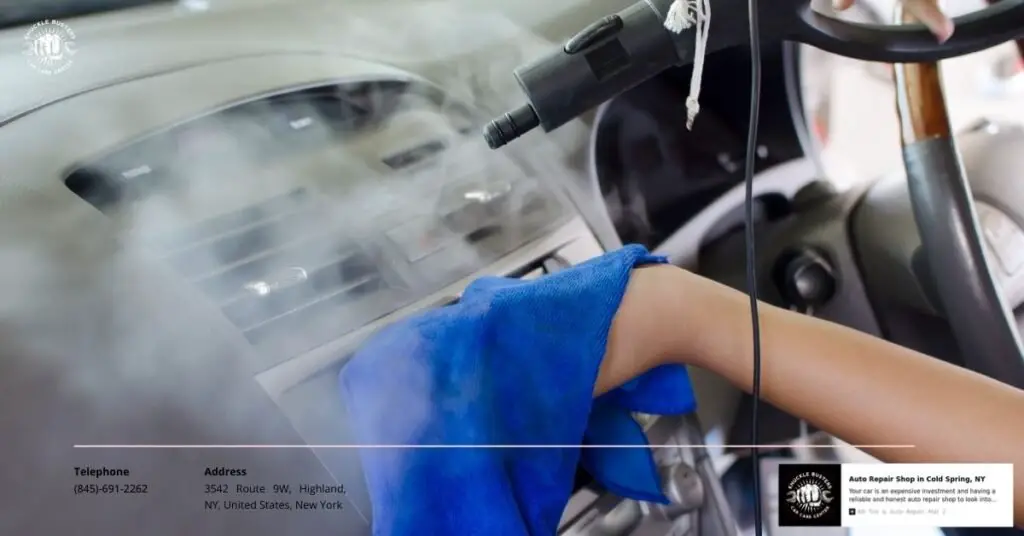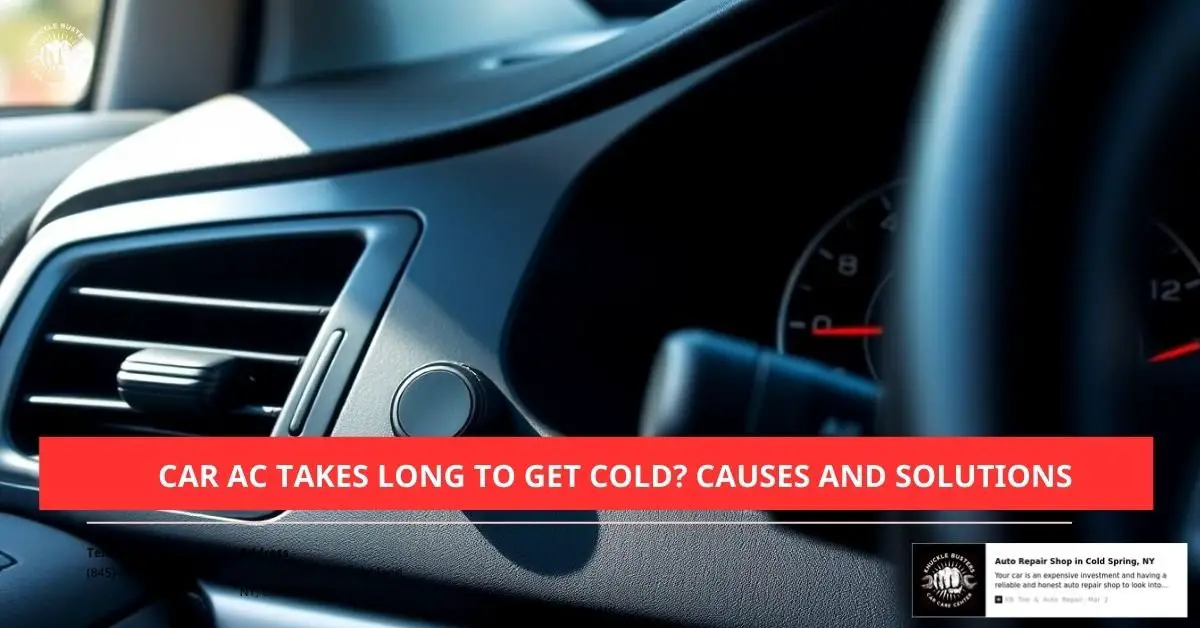- Low Refrigerant Levels: Insufficient refrigerant due to leaks can significantly reduce AC cooling efficiency.
- Faulty Compressor: A malfunctioning compressor disrupts refrigerant circulation, delaying cool air production.
- Clogged Condenser: Debris and obstructions in the condenser impede airflow, hindering the AC’s ability to cool effectively.
- Electrical Issues: Faulty wiring or blown fuses can prevent the AC system from operating correctly, leading to delayed cooling.
- Preventative Maintenance: Regular inspections and maintenance, such as cleaning the condenser and monitoring refrigerant levels, help ensure efficient AC performance.
When the summer heat hits, we all crave that refreshing blast of cool air from our car’s AC. But what do we do when it takes forever to get cold? It can turn a simple drive into an uncomfortable ordeal, leaving us sweating and frustrated.
Fortunately, we’re not alone in this experience. Many of us have faced the sluggish performance of a car AC and wondered what’s causing the delay. Understanding the common reasons behind this issue can help us find effective solutions and enjoy a comfortable ride once again.
Common Causes Why Car AC Takes Long To Get Cold
Several factors can delay your car’s AC from cooling properly. Understanding these issues helps in diagnosing and addressing the problem efficiently.
Low Refrigerant Levels
Low refrigerant disrupts the cooling cycle, reducing the AC’s ability to chill the air. Common leaks occur in hoses, connections, or the compressor. Measuring refrigerant pressure ensures accurate levels, and recharging the system restores optimal performance.
Faulty Compressor
A malfunctioning compressor impairs the AC system’s ability to circulate refrigerant. Signs include unusual noises or the AC not engaging. Inspecting the compressor’s clutch and electrical connections identifies issues, while replacing faulty components reinstates proper cooling function.
Clogged Condenser
A blocked condenser restricts airflow, hindering heat exchange and delaying cooling. Debris, such as leaves or dirt, often causes clogs. Cleaning the condenser fins and removing obstructions improves airflow, enhancing the AC’s ability to cool the interior effectively.
Electrical Issues
Electrical problems impede the AC system’s operation, causing delays in cooling. Faulty wiring, blown fuses, or malfunctioning sensors can disrupt the system. Diagnosing with a multimeter and repairing or replacing defective electrical components ensures the AC functions smoothly.
Diagnosing Your Car AC Problems

When your car’s AC takes too long to cool, diagnosing the issue helps identify the necessary repairs. We focus on key components to restore efficient cooling.
Checking Refrigerant Levels
Low refrigerant disrupts the cooling cycle. Refrigerant leaks often occur near the condenser, O-rings, seals, fittings, or hoses. We use an A/C pressure gauge or an electronic charging station to accurately measure refrigerant levels. If levels are low, we locate and repair the leak to ensure proper refrigerant circulation.
Inspecting the Compressor
The compressor circulates refrigerant through the system. If the compressor clutch doesn’t engage, the AC won’t cool effectively. We check whether the compressor clutch activates when the AC is turned on. A malfunctioning compressor requires repair or replacement to restore cooling performance.
Examining the Condenser for Blockages
A clogged condenser restricts airflow, reducing cooling efficiency. We inspect the condenser for debris, such as leaves or dirt, and ensure it’s free from obstructions. Cleaning the condenser improves airflow and enhances the AC system’s ability to cool the air quickly.
Testing Electrical Connections
Electrical issues can impede the AC system’s operation. We examine all electrical connections for signs of wear, corrosion, or loose fittings. Testing sensors, switches, and wiring ensures the AC system receives the necessary power and signals to function correctly. Repairing faulty electrical components restores reliable AC performance.
Solutions to Speed Up Car AC Cooling

Improving your car’s AC cooling speed involves addressing key components efficiently. We can enhance performance by focusing on refrigerant levels, the compressor, the condenser, and electrical systems.
Recharging the Refrigerant
Low refrigerant impairs AC cooling efficiency.
- Essential Role: Refrigerant cools the air effectively within the AC system. Leaks or depletion reduce its cooling capacity.
- Maintenance Steps: Verify refrigerant levels regularly and refill when necessary. Repair leaks promptly to maintain system integrity.
- Recommended Products: Utilizing A/C Pro assists in recharging the system and sealing leaks, potentially delivering colder air than when the car was new.
Replacing a Faulty Compressor
A malfunctioning compressor hinders refrigerant circulation.
- Critical Function: The compressor maintains the necessary pressure for refrigerant flow. Weak performance delays cooling.
- Signs of Failure: Slow pressure buildup or the need for high RPM to achieve normal pressures indicates compressor issues.
- Replacement Process: Installing a new compressor restores optimal refrigerant circulation and AC performance.
Cleaning or Replacing the Condenser
A clogged condenser restricts airflow, reducing cooling efficiency.
- Function of the Condenser: It dissipates heat from the refrigerant, enabling proper cooling of the air.
- Maintenance Actions: Clean the condenser regularly to remove debris and ensure unobstructed airflow. Replace if damage or severe clogging occurs.
- Benefits: Maintaining a clean condenser enhances heat dissipation, speeding up the cooling process.
Fixing Electrical Problems
Electrical issues can disrupt the AC system’s operation.
- Common Electrical Issues: Faulty wiring, blown fuses, or malfunctioning switches can prevent the AC from functioning correctly.
- Diagnostic Steps: Inspect electrical connections and components for signs of wear or damage. Use a multimeter to test electrical continuity.
- Solutions: Repair or replace defective electrical parts to restore proper AC functionality and improve cooling speed.
Preventative Maintenance Tips

Preventative maintenance keeps our car’s AC system running efficiently. Following these tips helps avoid cooling delays.
Regular AC System Inspections
Regular inspections maintain our AC system’s efficiency. A qualified technician identifies issues like leaks, faulty sensors, or electrical problems before they escalate. Annual inspections ensure smooth and efficient AC operation.
Keeping the Condenser Clean
Keeping the condenser clean boosts our AC’s cooling performance. The condenser, at the front of the car, often clogs with dirt, leaves, and debris, reducing efficiency. We regularly inspect and gently wash the condenser with water to remove buildup.
Using the AC Regularly
Using the AC regularly prevents system stagnation. Running the AC at least once a week keeps components lubricated and ensures optimal performance when needed.
Monitoring Refrigerant Levels
Monitoring refrigerant levels ensures our AC functions properly. We check refrigerant regularly and replenish it if levels drop, preventing cooling delays and maintaining efficiency.
Conclusion
We understand how frustrating it can be when your car’s AC takes forever to cool down. Taking proactive steps can make all the difference in enjoying comfortable drives, even on the hottest days.
By addressing issues like refrigerant levels, compressor health, and condenser cleanliness, we can keep our AC systems running efficiently. Regular maintenance not only enhances performance but also helps prevent unexpected cooling problems.
Let’s prioritize keeping our car’s air conditioning in top shape. With a bit of attention and care, we can ensure our journeys remain cool and pleasant all summer long.
Frequently Asked Questions
Why is my car’s AC taking too long to cool down?
A car’s AC may take too long to cool due to low refrigerant levels, a faulty compressor, a clogged condenser, or electrical issues. These problems can disrupt the cooling cycle, impair refrigerant circulation, restrict airflow, or hinder the system’s operation, leading to delayed cooling performance.
What causes low refrigerant levels in a car AC system?
Low refrigerant levels are often caused by leaks in components like the condenser, hoses, or connections. Over time, refrigerant can escape, reducing the AC system’s ability to cool effectively. Regular inspections and timely repairs are essential to maintain proper refrigerant levels.
How does a faulty compressor affect car AC performance?
A faulty compressor prevents proper circulation of refrigerant within the AC system. Without effective refrigerant flow, the system cannot absorb and dissipate heat efficiently, leading to slower cooling and reduced overall performance of the air conditioning.
What is the role of the condenser in a car’s AC system?
The condenser dissipates heat from the refrigerant by allowing airflow to pass through it. A clogged condenser restricts this airflow, reducing the system’s ability to release heat and cool the refrigerant effectively, which in turn slows down the cooling process in your car.
How can I identify electrical issues in my car’s AC system?
Electrical issues in a car’s AC system can include faulty wiring, damaged connectors, or malfunctioning sensors. Signs include the AC not turning on, inconsistent cooling, or unreliable compressor operation. Inspecting and repairing damaged electrical components can restore proper functionality.
What steps can I take to speed up my car’s AC cooling?
To speed up your car’s AC cooling, recharge the refrigerant, ensure the compressor is functioning correctly, clean or replace the condenser, and fix any electrical issues. Regular maintenance, such as checking refrigerant levels and inspecting system components, also helps enhance cooling efficiency.
Why is regular maintenance important for car air conditioning systems?
Regular maintenance helps identify and address issues like refrigerant leaks, compressor problems, and condenser blockages early. It ensures the AC system operates efficiently, prolongs its lifespan, and prevents unexpected cooling failures, keeping your car’s air conditioning performance optimal.
How does preventive maintenance enhance AC performance in cars?
Preventive maintenance includes regular inspections, cleaning components, and timely repairs, which help avoid common AC issues. By keeping the system clean and ensuring all parts function correctly, you can maintain efficient cooling performance and prevent delays in your car’s air conditioning.
Can using the AC regularly improve its performance?
Yes, using the AC regularly helps keep the system components in good working condition, prevents refrigerant from stagnating, and ensures that the compressor and other parts remain operational. This practice can enhance cooling performance and reduce the likelihood of future AC issues.
When should I seek professional help for my car’s AC problems?
If you’ve tried basic troubleshooting and your car’s AC is still slow to cool, it’s time to consult a qualified technician. Professional help is necessary to accurately diagnose issues like refrigerant leaks, compressor failures, condenser blockages, or complex electrical problems.

